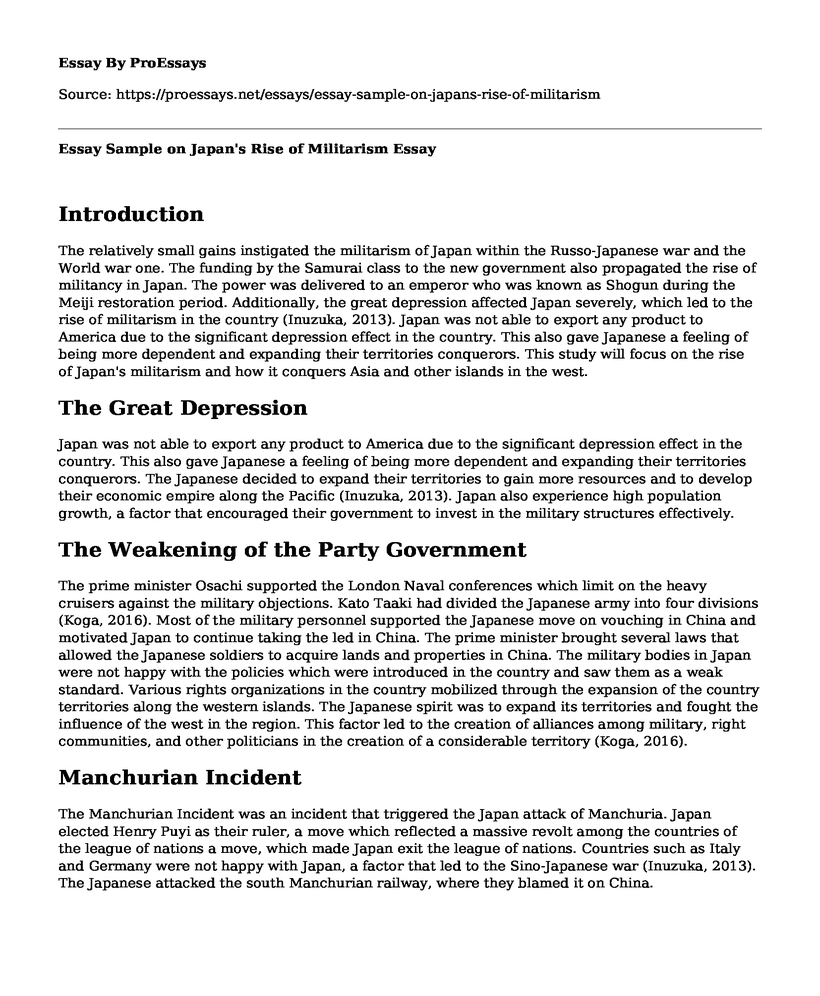Introduction
The relatively small gains instigated the militarism of Japan within the Russo-Japanese war and the World war one. The funding by the Samurai class to the new government also propagated the rise of militancy in Japan. The power was delivered to an emperor who was known as Shogun during the Meiji restoration period. Additionally, the great depression affected Japan severely, which led to the rise of militarism in the country (Inuzuka, 2013). Japan was not able to export any product to America due to the significant depression effect in the country. This also gave Japanese a feeling of being more dependent and expanding their territories conquerors. This study will focus on the rise of Japan's militarism and how it conquers Asia and other islands in the west.
The Great Depression
Japan was not able to export any product to America due to the significant depression effect in the country. This also gave Japanese a feeling of being more dependent and expanding their territories conquerors. The Japanese decided to expand their territories to gain more resources and to develop their economic empire along the Pacific (Inuzuka, 2013). Japan also experience high population growth, a factor that encouraged their government to invest in the military structures effectively.
The Weakening of the Party Government
The prime minister Osachi supported the London Naval conferences which limit on the heavy cruisers against the military objections. Kato Taaki had divided the Japanese army into four divisions (Koga, 2016). Most of the military personnel supported the Japanese move on vouching in China and motivated Japan to continue taking the led in China. The prime minister brought several laws that allowed the Japanese soldiers to acquire lands and properties in China. The military bodies in Japan were not happy with the policies which were introduced in the country and saw them as a weak standard. Various rights organizations in the country mobilized through the expansion of the country territories along the western islands. The Japanese spirit was to expand its territories and fought the influence of the west in the region. This factor led to the creation of alliances among military, right communities, and other politicians in the creation of a considerable territory (Koga, 2016).
Manchurian Incident
The Manchurian Incident was an incident that triggered the Japan attack of Manchuria. Japan elected Henry Puyi as their ruler, a move which reflected a massive revolt among the countries of the league of nations a move, which made Japan exit the league of nations. Countries such as Italy and Germany were not happy with Japan, a factor that led to the Sino-Japanese war (Inuzuka, 2013). The Japanese attacked the south Manchurian railway, where they blamed it on China.
Second Sino-Japanese War
The Japanese also attacked Beijing in Marco Polo Bridge, an incident that led to the rise if the Sino-Japanese war. The war between Japan and China was referred to as an undeclared war since the invasion of Japan to Manchuria. The war then grew to form the better part of the second world war in 1941 (Inuzuka, 2013). After the Japanese have coincidently accused the Chinese of the destruction of the South Manchurian railway, they reclaimed the Mukden and the rest of the Manchuria. The Japanese then established their state in Manchuria after seizing Mukden.
Conflict of Britain, the United States, and Japan
Japan was very ruthless and cruel while undertaking their fighting for more land and resources allocations. In China, for instance, they killed over 300000 people and raped over 80000 women (Inuzuka, 2013). Japan also attacked 2400 Americans a move which made the United States enter into the world war II. American was forced to drop two nuclear bombs on Hiroshima and Nagasaki, which killed approximately 200000 people (Inuzuka, 2013). The British were also not happy with the Japanese rulings and policies; this made the British support the United States in fighting the Japanese military system.
References
Inuzuka, A. (2013). Remembering Japanese militarism through the Fusosha textbook: the collective memory of the Asian-Pacific War in Japan. Communication Quarterly, 61(2), 131-150.Retrieved from https://www.tandfonline.com/doi/abs/10.1080/01463373.2012.751432
Koga, K. (2016). The Yasukuni question: histories, logics, and Japan-South Korea relations. The Pacific Review, 29(3), 331-359.Retrieved from https://www.tandfonline.com/doi/abs/10.1080/09512748.2015.1022583
Cite this page
Essay Sample on Japan's Rise of Militarism. (2023, Mar 27). Retrieved from https://proessays.net/essays/essay-sample-on-japans-rise-of-militarism
If you are the original author of this essay and no longer wish to have it published on the ProEssays website, please click below to request its removal:
- Paper Example on the United Kingdom Police Force
- Essay Example on Cultural Immersion in Cincinnati: Rich Cultural Identity
- Essay Example on 400K Lives Lost: The Opioid Crisis in America
- Modern Child Slavery: Examining Scale and Programs to Assist Endangered Children - Essay Sample
- U.S. Faces Evolving Terror Threat: 17 Years After Homeland Security - Essay Sample
- Nazis: From 1919 to Hitler's Leadership in 1921 - Essay Sample
- Free Report Sample on Canadian Red Cross: Humanitarian & Community Support







